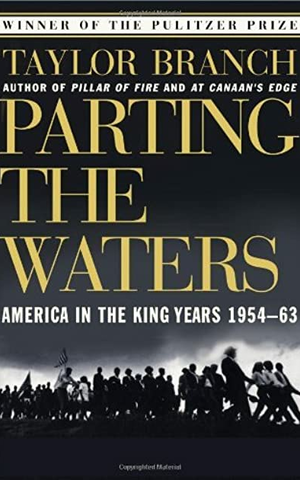
Parting the Waters: America in the King Years, 1954-63
- Book
- Nov 15, 1988
- #History #AmericanHistory
In Parting the Waters, the first volume of his essential America in the King Years series, Pulitzer Prize winner Taylor Branch gives a “compelling…masterfully told” (The Wall Street...
Show More
Number of Pages: 1120
ISBN: 0671687425
ISBN-13: 9780671687427
Mentions
See All
Ryan Holiday @RyanHoliday
·
Dec 22, 2020
- Curated in The (Very) Best Books I Read in 2020
I’ve raved about some of my favorite epic biographies before: Robert Caro’s LBJ, William Manchester’s Churchill, Gibbon’s Decline and Fall, Well, add another to the list. Taylor Branch’s definitive series on Martin Luther King Jr. and the American civil rights movement has not only been riveting, eye-opening and humbling, it’s been the perfect vehicle to help me understand what’s happening in the world right now. I finished Parting the Waters and immediately picked up Volume II, Pillar of Fire. I’ve come to believe that one of the best ways to become an informed citizen in the present is not to watch the news, but to read history. The actor Hugh Jackman said in an interview a few months ago that he’s been getting his news by keeping his eye on the big picture—going through the Ken Burns catalog and reading books like Meditations. “That’s the way you should understand events and humanity,” he said, “with that sort of 30,000-foot view.” If you want to understand what’s happening in the United States right now as it pertains to race, get off Twitter and read these books. On that note, I re-read Invisible Man, first published in 1952, in light of the killings of Ahmaud Arbery, Breonna Taylor and George Floyd. There are many “anti-racist” reading lists floating around, but how many of the books on those lists will still be readable in 70 years? Do yourself a favor and read this. It’s not going anywhere because it is timeless—and sadly, very timely. I also learned so much from Edward Ball’s Life of a Klansman (and when I interviewed him) and just as much from Albion W. Tourgee’s A Fool’s Errand (Albion was one of the legal advisors in Plessy v. Ferguson). Strongly recommend one or both of these books to anyone who wants to become better informed instead of more partisan. My study of this history has been ongoing, but I feel I have learned far more these books than I have from the trendy white fragility books going around. Also if you’re interested, here’s a step I have taken in regards to Confederate monuments (that is: literal white supremacy monuments, as you’ll learn in these books and some of my interviews on the topic) in my town.